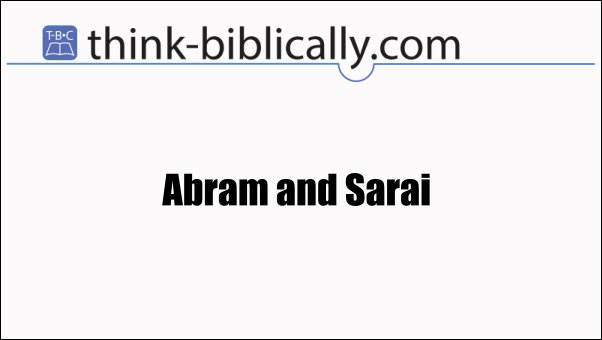By Tyson Thorne

A few months ago we ended a series examining many of the names of God and how those names reveal something important about his character. Yesterday we talked about how important the names of people can be, so much so that in a few instances God specifically told parents what to name their children (there are far more instances of this than we examined). Today we'll look at two examples where God changes people's names, specifically Abraham and Sarah. In each case God changes only one letter of their name. It makes one wonder, why bother? What difference does it make?
Abram bowed down with his face to the ground, and God said to him, “As for me, this is my covenant with you: You will be the father of a multitude of nations. No longer will your name be Abram. Instead, your name will be Abraham because I will make you the father of a multitude of nations.
In English it appears two letters were inserted into Abram's name, but in Hebrew the difference is only one letter. Julia Blum from the Israel Institute for Biblical Studies explains:
The original name “Abram”, Avram in Hebrew (אַבְרָם), is composed of two words Av and Ram, which together means “exalted father”. In Hebrew, the irony of this name is obvious: Abram hadn’t been a father for long! But when the letter ה is added, it turns “exalted” into “multitude” or “many”. So, this new name, Abraham (Avraham אַבְרָהָם), reflects God’s plan and promise, “a father of many nations”.
Shortly after changing Abram's name, God changes Sarai's name to Sarah. Again, it's just one letter but it makes a huge difference. Along with the name change God delivers the news that she will have a son. Rashi, a Jewish commentator from the medieval times, wrote regarding this passage, “You shall not call her name Sarai”, meaning “my princess”, “but Sarah shall be her name”, that she will be a princess over all." The force of God's work in Abraham's life is no longer on the family of Abram, but on the multitude of Abraham’s descendants.
Hopefully you've seen over the last two posts how important names are in the Bible. Pay attention to the footnotes in your English translation to learn what a name means. If you're good with learning languages there is great value in learning the languages of Bible. The Israel Institute for Biblical Studies offers free classes, from time to time, on the Hebrew language. Even if it isn't free, its worth the investment. They are a partner of Think-Biblically.com and, if you are interested in taking Hebrew or other courses, please click their banner at the bottom of this page. You'll be helping yourself, and us.
